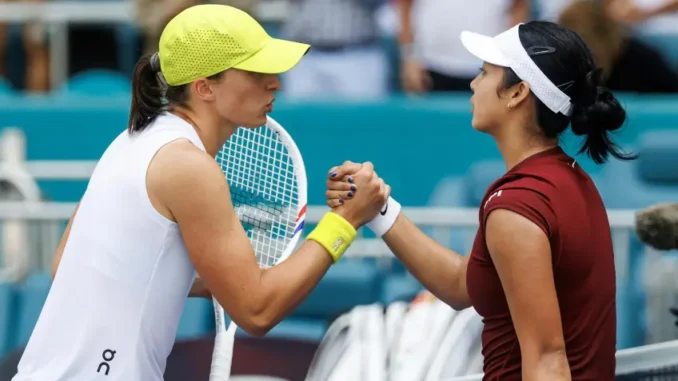
On a steamy night in Miami, the Hard Rock Stadium bore witness to a seismic upset that sent shockwaves through the tennis world. It was March 26, 2025, and Iga Swiatek, the world No. 2 and a five-time Grand Slam champion, found herself on the losing end of a 6-2, 7-5 stunner against Alexandra Eala, a 19-year-old wildcard from the Philippines ranked No. 140. The quarterfinal clash at the Miami Open wasn’t just a match—it was a statement, a moment where a rising star toppled a titan. Afterward, Swiatek, ever the introspective competitor, dissected what went wrong, offering a candid analysis of how Eala’s fearless play caught her off guard and turned the tables in a contest that few saw coming.
Swiatek entered the match as the overwhelming favorite, her resume glittering with titles and her hard-court prowess well-documented. She’d sailed through the earlier rounds without dropping a set, dispatching the likes of Caroline Garcia, Elise Mertens, and Elina Svitolina with the kind of clinical precision that’s made her a household name. But Eala, a left-handed dynamo with a junior US Open title to her name, had other plans. She’d already turned heads in Miami, knocking out Grand Slam champions Jelena Ostapenko and Madison Keys, and earning a walkover from an injured Paula Badosa. Against Swiatek, she didn’t just compete—she dominated, breaking the Pole’s serve eight times in a match that lasted an hour and 39 minutes.
Reflecting on the defeat, Swiatek pinpointed Eala’s unexpected aggression as the game-changer. “For sure I did not know she was going to play that flat,” she admitted, her tone revealing a mix of surprise and respect. Eala’s shots, delivered with a venomous pace and depth, disrupted Swiatek’s rhythm from the baseline, a place where the Pole usually reigns supreme. “She was very aggressive and stayed on target the whole match,” Swiatek added, noting how Eala’s returns—long and unrelenting—made it tough to regain control. The Filipina’s ability to pounce on every opportunity, especially on Swiatek’s serve, left the second seed scrambling, her usual poise replaced by a flurry of uncharacteristic errors—32 unforced mistakes to Eala’s 12.
The match unfolded like a David-and-Goliath tale with a modern twist. Swiatek started strong, breaking Eala in the opening game, but the teenager fired back immediately, leveling the score and then surging ahead. The first set was a rout, with Eala breaking four times to claim it 6-2, her forehand winners slicing through the humid air like lightning bolts. Swiatek, who racked up 19 unforced errors in that set alone, took a bathroom break to regroup, but the reset couldn’t halt Eala’s momentum. In the second set, Swiatek clawed her way to a 4-2 lead, even serving for the set at 5-4. “I was just happy I started feeling a bit better,” she said, recalling a fleeting moment of hope. But Eala, unfazed, broke back and seized the final three games, sealing the upset with a deep return that forced one last Swiatek error.
Swiatek’s analysis didn’t linger on her own struggles—she gave credit where it was due. “A lot of these shots were coming out of nowhere,” she marveled, acknowledging Eala’s knack for pulling off the unexpected. The Filipina’s composure under pressure, honed at the Rafael Nadal Academy where Swiatek once handed her a graduation certificate, shone through. With Toni Nadal in her box, Eala played with a maturity beyond her years, her lefty serve—spinning at modest speeds but devilishly effective—adding another layer of difficulty. “She went all in,” Swiatek noted, a nod to the teenager’s fearless approach against a player she’d idolized.
For Swiatek, the loss marked a rare stumble—only her third defeat to a player outside the top 100 in a WTA main draw—and extended a title drought that’s lingered since her French Open triumph the previous year. Yet, her focus quickly shifted forward. “I don’t want to think about it too much,” she said of the upset. “It’s good to learn from defeats, but there are other things ahead, and I’m happy we’re going to be playing on clay now.” As she prepares to defend her clay-court crowns, Swiatek’s Miami exit serves as a reminder of tennis’s unpredictability—and of Eala’s arrival as a force to watch. For the Filipina, it’s a historic leap into the semifinals, a dream run fueled by belief and a blueprint that even a champion like Swiatek couldn’t crack.
Leave a Reply